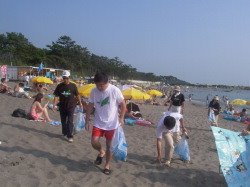Cleaning up the beaches

The Mainichi had this story about Kanagawa Governor Shigefumi Matsuzawa who helped collecting trash from the beach in Hayama, Kanagawa Prefecture:
Matsuzawa joined about 100 people to pick up cigarette butts and other trash from the beach on Aug. 5, the same day that temperatures in the prefecture soared to 36.8 degrees in Ebina and 35.3 degrees in Yokohama.
About 30 people, including Matsuzawa, prefectural government employees and officials from the joint public and private sector organization, Kanagawa Coastal Beautification Foundation, wore Mottainai T-shirts on the day.
"Just getting the government to do things is not enough," Matsuzawa said. "We want everybody who lives near or comes to play in coastal areas to realize how important it is to have a campaign like this that keeps these places clean."
Matsuzawa used a parasol while walking along the beach and throwing trash into his Mottainai garbage bag. When people saw the governor picking up trash, they joined him to help out. The gatherers collected large amounts of trash, mostly food containers and wrapping.
Good to see a politician actually doing something!
Garbage on beaches is a huge problem in other parts of Asia as well. While most (80-85%) of the garbage found there is Korean, Hankyoreh reported that a significant number of Chinese medicine bottles have been found on local beaches, evidence that China is not doing enough to take care of medical wastes. The Korean press is also noting that Japan has become particularly sensitive regarding an inflow of Korean sea waste:
In 2003 and 2005, Japan sent marine security officials to South Korea’s Ministry of Maritime and Fisheries to ask Seoul to set up countermeasures regarding the influx of sea waste from Korean shores.
In one Japanese prefecture, Ishikawa, about 38 percent of the total garbage washed up came from South Korea, according to a research survey. Only seven percent of the waste was from China and Thailand.
In another Japanese prefecture called Kanakawa, about 70 percent of plastic waste came from overseas and of that waste, 80 percent originated from North and South Korea.
Beach garbage previous

Comments
The problem is not just a lack of "controlling" wastes, it is production of them in the first place. How much of what is produced today is truly needed? Are we really making a "higher" standard of living? For whom? The elite who leave the mess behind for their tropical havens which they have not yet polluted?
Of course it is ever growing production and consumption (of anything) that drives capitalism, so my talk of sustainable living is heresy.